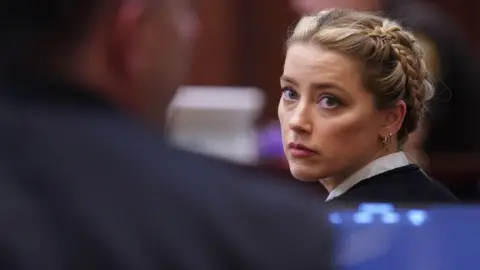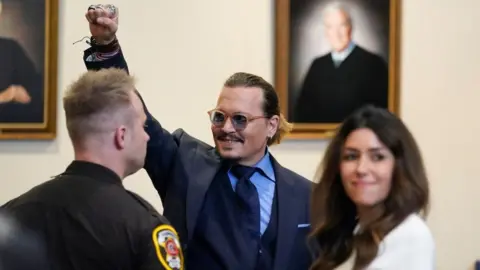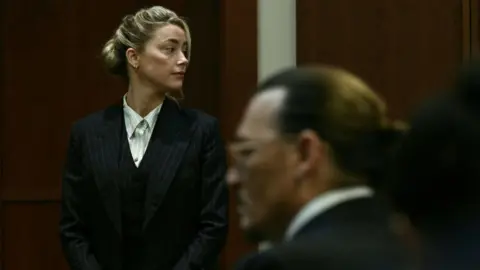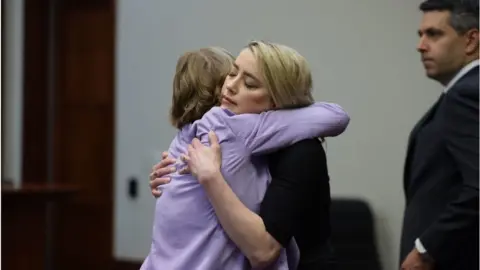Could toxic Depp-Heard case have chilling effect on accusers?
 Getty Images
Getty ImagesAmber Heard became a victim of vicious online harassment during her defamation battle with Johnny Depp, involving allegations of intimate-partner violence. Could the case have a chilling effect on other accusers coming forward?
A Virginia jury found on Wednesday that Johnny Depp was defamed by Amber Heard in a 2018 op-ed in which she described herself as a "public figure representing domestic abuse", without naming Mr Depp.
The seven jurors mostly rejected Ms Heard's counterclaim, awarding her $2m in damages for a single count of her suit - an amount eclipsed by the more than $10m awarded to her ex-husband.
The verdict surprised some legal experts, especially as it followed Mr Depp's loss in a similar case in the UK nearly two years ago.
And for Ms Heard, it was an almost wholesale rejection of her testimony.
Mr Depp, 58, has fiercely denied his former partner's allegations of emotional, physical and sexual abuse, which she claimed took place on several occasions throughout their five-year relationship. This week, the jury sided with Mr Depp, determining the allegations were false.
In a statement, Ms Heard, 36, said she was "heartbroken" by the ruling. Her team has said she will appeal.
But in the court of public opinion, it seemed Ms Heard had already lost.
Over six weeks of trial - long before the jury returned its verdict - a consensus was established online that Ms Heard was lying. Her testimony was widely mocked, hashtags calling her a sociopath trended on Twitter, and a petition to remove her from the upcoming Aquaman 2 has, to date, received more than 4.4m signatures. On TikTok, couples acted out graphic acts of violence alleged by Ms Heard on the stand, in an apparent effort to show they were fabricated.
"I think that's something we should be really clear-minded about moving forward: this trial has led to a huge amount of harassment toward Amber Heard," said Dr Nicole Bedera, a sociologist who specialises in sexual violence. "It was shocking."
 Getty Images
Getty ImagesDomestic violence experts like Ms Bedera fear the intensely negative response toward Ms Heard will have repercussions far beyond the trial. Many warn that the online abuse she suffered will have a chilling effect on survivors, deterring some from reporting their stories of abuse.
"There are a lot of survivors who will see their story in this trial. They will be harmed by this case, too," Ms Bedera said. "I think a lot of victims will be more nervous about coming forward in the future."
Already, domestic assault is chronically underreported. Only two out of every five instances of domestic violence are reported to police in the US, according to the latest survey from the Department of Justice. That same number - about 40% - come forward with reports of intimate partner violence.
"I think it's become clear that survivors are making rational decisions when they decide not to come forward," said Alexandra Brodsky, a civil rights attorney and author of Sexual Justice. "They are engaged in a cost/benefit analysis, and often that calculus shows them they're better off not reporting."
That balance is weighted heavily by the fear of a painful investigation and trial, and a fear of not being believed.
Both were crystallised by the response to Ms Heard, said Kelly Sundberg, a professor at Ashland University and author of Goodbye Sweet Girl, a memoir about her experience in an abusive relationship. "There is a reason that most people keep their abuse private."
"Even if she [Heard] had won, this would have had a chilling effect on survivors because no-one wants to be disbelieved and discredited on the kind of scale that she was," said Ms Sundberg.
"If I had seen this kind of response before I wrote my book, I don't think I would have felt safe publishing it," she said.
"It was horrific," Ms Bedera added. "People called her a psycho, a liar, they said she was crazy, she was manipulative, they said that she deserved what happened to her."
 BRENDAN SMIALOWSKI
BRENDAN SMIALOWSKIIn the final week of trial, Ms Heard, single mother to her one-year-old daughter, addressed the harassment in court saying she had received "hundreds of death threats regularly, if not daily".
"People want to kill me, they tell me so, everyday. People want to put my baby in a microwave, and they tell me," she said. "It has been agonising."
During the trial, the court heard recordings of Ms Heard seeming to taunt and bully her former partner. In one clip, she admits to "hitting" Mr Depp before telling him not to be a "baby".
"Tell the world, Johnny," she says in another, recorded in 2016. "Tell them, 'I, Johnny Depp, a man, a victim, too, of domestic violence.'"
These clips were routinely employed as evidence on social media that Ms Heard was lying, and was the "real" aggressor in her relationship.
But that same scrutiny did not seem to apply to Mr Depp.
The court heard numerous witnesses, including his former girlfriend actor Ellen Barkin, describe his alleged drug and alcohol abuse and violent tendencies. In recorded audio, the court heard Mr Depp shout insults and obscenities at Ms Heard, and saw messages in which he said he wished Ms Heard would die.
"There was a double standard without a doubt," Ms Bedera said.
"Johnny Depp has also said some really horrific things. The text messages about killing and raping Amber Heard come to mind," she said. "A lot of people were quick to say 'it was just a joke.'"
 Getty Images
Getty ImagesExperts also fear the legal path used by Mr Depp - filing a defamation case - may be used by perpetrators of abuse.
"One thing that's really gotten lost in the coverage is that this was not Heard suing Depp for abuse," civil lawyer Alexandra Brodsky said. "It was Depp suing Heard for saying she was abused at all, and not even by him."
Ms Brodksy described a growing "cottage industry" of lawyers and PR consultants who advise young men on how to clear their name after being accused of sexual assault in college. "A big part of that is defamation suits, or at least threatening defamation suits. We've seen that strategy spread," she said.
In this case, after six weeks of testimony, the jury ruled unanimously that Mr Depp had been defamed by Ms Heard in her 2018 Washington Post op-ed - effectively vindicating his denials of abuse. "The jury gave me my life back," he said in a statement following the verdict.
But seeking damages for defamation becomes "alarming" when it is used by perpetrators as a PR strategy, Ms Brodsky said,
"The truth is that no matter what happened at the end of the trial, Depp would have - at least among some people - come out the hero," she said. "I really do worry about the copycat effect."
At the same time these cases act as a deterrent for survivors in general, Ms Brodsky said. "Someone sees their friend, their classmate or a celebrity face a defamation suit and they say 'I don't want to deal with that.'"

Reputation: Depp v Heard. Watch key moments from the trial on iPlayer (UK-only).

